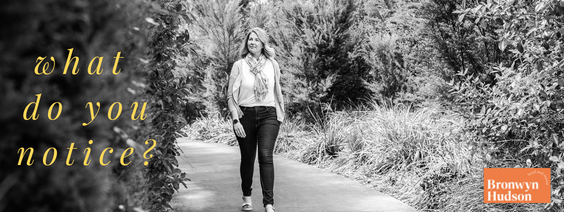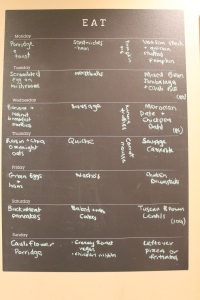Have you noticed?

Noticing isn’t random.
We notice what we look for.
We notice what we fear.
We notice what we judge.
We notice what we are attracted to.
We notice what we measure.
We notice what makes sense.
But Bron, I hear you asking, what does noticing have to do with the food-mood connection?
Well, as it turns out, quite a lot! In fact, the seemingly simple act of noticing is key when it comes to connecting how you feel (mood) and what you eat (food).
Noticing our thoughts, our feelings and how they link to food choices and cravings:
- ever eaten when you weren’t physically hungry to reward yourself, or because you ‘deserve’ to after the day you’ve had?
- ever craved food when you are feeling anxious or worried?
- have you ever finished a packet of crisps and not really remember eating them all?
You see, when we notice what the actual ‘hunger’ is that we are trying to feed, we can then identify the ‘food’ that best fits the need. It is the noticing that comes first. The first part of behaviour change.
If you notice you were eating because you were bored, how else can you feed that boredom? What activities energise you, light you up? Instead of mindlessly eating to escape the feeling of boredom, can you spend 5 minutes doing something you love, then assess your physical hunger?
If you have trouble knowing what you love doing, isn’t that great to have learnt about yourself! Perhaps now you can lean into noticing and learning more about who you are and what is really important to you. This is part of my mental health coaching approach, especially identifying values and learning to take values-guided action steps.
In this weeks small group coaching as part of the 8 Week Energiser programme we are running, we were talking about emotional eating. One of the participants noticed that she craves more on her day in the office than she does on her days working at home (the complete opposite of me!). She wasn’t sure why – wondering if it perhaps was linked to there not being food available on demand at work as it is at home. This is very valid – as the research shows that having less access to food and/or restricting food often leads to more food cravings and intrusive thoughts about food.
However, she didn’t feel this 100% explained what she was experiencing. So we delved deeper. What else was different between working from home vs the office. She identified that the office was noiser and she was distracted easier – and then boom, I saw it. What she was looking for – her ‘hunger’ – was for more calm and focus. And she already knew what ‘foods’ provided that for her – a quiet space and some breath work. She is going to try incorporating this into her next day in the office, and I can’t wait to hear how it goes!
Noticing how eating different foods and eating patterns affect how you feel
- How quickly do you get hungry again after certain meals?
- Are there certain foods or meals that seem to keep your energy and focus going for several hours, and others that leave you needing a nap or standing in the pantry 1 hour later?
- What impact does the time of day you eat have on your energy across the day?
- Do you experience a mid-afternoon energy slump?
- Have you felt jittery or anxious when you are in need of food?
Noticing the way that food affects how you feel helps you tune in to learning your unique blueprint for nourishing your body and mind.
I feel that we have got so caught up in diets and rules about eating, that we have lost touch with what works for us.
While I am deep into the science (definitely a bit of a science geek), and follow an evidence-based approach, I also am aware that nutritional science identifies a few key factors that are universally true for most of us, but there is no one way of eating that is best for everyone.
And that can be really confusing, right?
Until you tune back in and notice how eating in different ways affects your mood and how you feel.
I have some clients working through my Spring Reset programme at present, and they are noticing. They are noticing they are waking more refreshed, that their productivity has increased, that the feel nourished and cravings have disappeared. One noticed ongoing pain in her hands had halved.
As they transition through a reintroduction phase, the entire focus is on noticing how each new food we add in works for them uniquely. Then they can make more informed decisions about how to eat for how they want to feel – and the food confusion melts away.
See how important noticing is when it comes to the food-mood connection?
Noticing brings consciousness. And consciousness promotes personal growth. Noticing is about curiosity – not judgement.
When we lean into noticing our thoughts, our feelings and how they are related to our eating, as well as noticing how what and how we eat affects how we feel, we open up the opportunity to:
- move towards a calmer relationship with food
- become more intuitive about eating in a way that supports how we feel
- develop skills to accept our thoughts and feelings for what they are
- notice opportunities to be kind to ourselves
- align our actions to the areas of our lives that are important to us
What are you going to notice more of today? It isn’t random…
Noticing how our thoughts and feelings influence our relationship with food, the control it has over us when we are hooked by these thoughts and feelings, then learning how to unhook and take meaningful action is a key part of the acceptance and commitment therapy (ACT) tools that I integrate into my coaching. My nutritional science passion area and speciality is mental health nutrition, how what we eat can affect our short term mood and focus and our longer term mental wellbeing. If you’d like to chat about how my approach helps you live the meaningful life you want to live, book a time to connect here.











One Comment